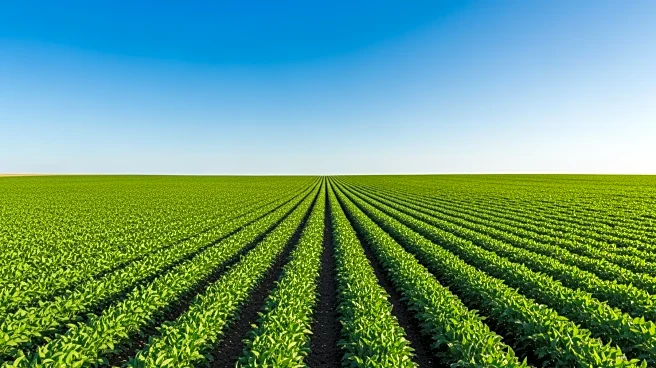What's Happening?
Algeria has announced a 4% increase in its agriculture budget for 2026, totaling 764.2 billion dinars (US$5.84 billion). This decision, revealed by Minister of Agriculture Yacine El-Mahdi Oualid, aims
to boost domestic production and reduce reliance on food imports. The budget allocation prioritizes agriculture and rural development, with additional funds directed towards forestry, general administration, and fishing. Despite agriculture contributing 13% to Algeria's GDP, the sector faces challenges such as low cereal yields and post-harvest losses. The government plans to address these issues through technology adoption and infrastructure improvements.
Why It's Important?
Algeria's increased investment in agriculture is crucial for enhancing food security and reducing import dependency, as the country is Africa's second-largest food importer. The focus on improving productivity and infrastructure is expected to strengthen the agricultural sector's contribution to the economy. This move aligns with global trends towards self-sufficiency and sustainable development, addressing challenges like climate change and resource scarcity. The budget increase reflects Algeria's commitment to modernizing agriculture, which could have long-term benefits for economic stability and rural livelihoods.
What's Next?
The Algerian government is expected to implement programs targeting irrigation efficiency, seed system improvement, and agri-food processing. These initiatives aim to increase cereal yields and reduce post-harvest losses, addressing key weaknesses in the sector. The success of these programs will depend on effective policy execution and collaboration with stakeholders. As Algeria seeks to enhance its agricultural output, monitoring and evaluation will be crucial to ensure the efficient use of resources and the achievement of food security goals.
Beyond the Headlines
The focus on agriculture modernization in Algeria highlights the intersection of technology and traditional farming practices. The adoption of modern irrigation systems and infrastructure improvements could lead to significant shifts in rural communities, affecting cultural practices and employment patterns. Additionally, the emphasis on reducing import dependency may influence trade dynamics and regional cooperation in North Africa.









